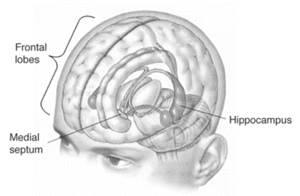亨利·莫萊森
| 亨利·古斯塔夫·莫萊森 Henry Gustav Molaison | |
|---|---|
| 出生 | 1926年2月26日 |
| 逝世 | 2008年12月2日(82歲) |
亨利·古斯塔夫·莫萊森(英語:Henry Gustav Molaison,1926年2月26日—2008年12月2日),在醫學界以 H.M.知名。他是一位美國籍的記憶障礙患者,原因是因為他曾罹患嚴重的癲癇症。當時為了治好他的症狀,威廉·B·斯科維爾醫生對他施行了雙內側前顳葉切除術,移除了他大腦中三分之二的海馬體 、海馬旁回、內嗅皮層、梨狀皮質,以及杏仁核。他自1957年後,開始接受學界對他廣泛的研究,直至於2008年逝世為止。[1][2] 他的案例對於大腦在學習記憶功能,以及認知神經心理學(心理學的分支之一,旨在了解大腦的結構和功能,及其與心理學上的關聯)的學術研究方面,佔有非常重要的角色。 他住在溫莎洛克斯鎮的一所看護中心,並在那裏作為被研究調查的對象。[3]
2009年12月4日,莫萊森的大腦被保存在加利福尼亞大學聖地牙哥分校[4],研究者可在該校找到相關的資料[5],另一個在死後得到同等待遇的人是愛因斯坦[6]。
生平
[編輯]
莫萊森生於1926年2月26日,7歲時因為一次自行車事故而得了頑固型癲癇。(對於此事故,早期的報導指是於9歲時發生,後來在患者母親的指正下改為7歲[7])。此後,他就為局部發作癲癇所苦;16歲生日後,又發生了幾次僵直性癲癇。1953年,他開始接受哈特福醫院神經外科一位名叫威廉·B·斯科維爾(William Beecher Scoville)醫生的治療。[2]
史可維爾醫生認為,莫萊森的癲癇與左右腦的「內側中央顳葉」(medial temporal lobes,MTLS)有關,故建議切除MTLS。1953年8月25日,27歲的莫萊森接受了雙內側前顳葉切除術,他的海馬構造與鄰近組織,大部分的杏仁核與內鼻皮層也被切除。此後,他的海馬體完全無功能,因為剩餘約2厘米的海馬組織已萎縮,且負責傳遞感覺給海馬體的內鼻皮層也被損毀,而他的部分外側顳葉也被破壞。
此次手術,雖然成功的控制了莫萊森的癲癇症狀,但卻帶來了嚴重的痛苦-順行性遺忘症。儘管他的工作記憶與程序記憶是完好的,但他無法運用他的外顯記憶記住新事物。根據部分科學家的研究,莫萊森學習新語義知識的能力受到損害[8] ,但研究人員對損害的程度有爭議。他也有一定程度的逆行性失憶症障礙,不能記得手術前一至二年前的大部分,與11年前的部分事物,這表示他的失憶症是屬於短期漸進型 (temporally graded);然而,他的長期程序記憶能力是完好的,因此他可以學習例如新的動作技能,儘管莫萊森不會記得他曾經學過。
這個案例,是由史可維爾醫生與布倫達·米爾納(Brenda Milner)在1957年的研究報告中首次提出的[9] 。在莫萊森的晚年,他不斷地填寫填字遊戲[10],他能藉由1953年以前學到的知識中得到線索來填寫答案;對於1953年以後的資訊,他能修正他的舊記憶與新記憶,例如他曾修正自己對於喬納斯·索爾克發明小兒麻痺疫苗的記憶[1]。
他於2008年12月2日過世[2]。
參閱
[編輯]參考文獻
[編輯]- ^ 1.0 1.1 Benedict Carey. No Memory, but He Filled In the Blanks. New York Times. December 6, 2010 [2008-12-05]. (原始內容存檔於2018-06-13).
Henry Gustav Molaison — known through most of his life only as H.M., to protect his privacy — became the most studied patient in the history of brain science after 1953, when an experimental brain operation left him, at age 27, unable to form new declarative memories. ... After repeated trials on the same puzzles, the man who lost his memory learned to fill in the right answers. 'We found that he could learn new semantic, factual information as long as he had something in his memory to anchor it to,' Dr. Skotko said.
- ^ 2.0 2.1 2.2 Benedict Carey. H. M., an Unforgettable Amnesiac, Dies at 82. New York Times. December 4, 2008 [2008-12-05]. (原始內容存檔於2018-06-13).
In 1953, he underwent an experimental brain operation in Hartford to correct a seizure disorder, only to emerge from it fundamentally and irreparably changed. He developed a syndrome neurologists call profound amnesia. He had lost the ability to form new declarative memories.
- ^ Schaffhausen, Joanna. Henry Right Now. The Day His World Stood Still. BrainConnection.com. [2008-08-05]. (原始內容存檔於2008-02-09).
- ^ Arielle Levin Becker. Researchers To Study Pieces Of Unique Brain. The Hartford Courant. November 29, 2009 [2015-05-18]. (原始內容存檔於2010-01-06).
- ^ Scientists Digitize Psychology’s Most Famous Brain (頁面存檔備份,存於互聯網檔案館), Wired.com
- ^ 新京報. 目擊!切開最珍貴大腦 網絡直播40萬人觀看. 人民網. 新京報. 2009-12-14 [2015-05-18]. (原始內容存檔於2018-09-30).
- ^ Corkin, Suzanne. Lasting consequences of bilateral medial temporal lobectomy: Clinical course and experimental findings in H.M.. Seminars in Neurology (New York, NY: Thieme-Stratton Inc.). 1984, 4 (4): 249–259. doi:10.1055/s-2008-1041556.
- ^ Schmolck, Kensinger, Corkin, & Squire, 2002
- ^ William Beecher Scoville and Brenda Milner. Loss of recent memory after bilateral hippocampal lesions. Journal of Neurology, Neurosurgery and Psychiatry. 1957, 20 (1): 11–21. PMC 497229
 . PMID 13406589. doi:10.1136/jnnp.20.1.11.
. PMID 13406589. doi:10.1136/jnnp.20.1.11.
- ^ The Man Who Couldn't Remember. NOVA scienceNOW. June 1, 2009 [2010-12-09]. (原始內容存檔於2018-10-05).
In between it all he did puzzles, books upon books of them, a habit he’d picked up as a teenager. Near the end of his life he kept a crossword book and pen with him always, in a basket attached to his walker.
